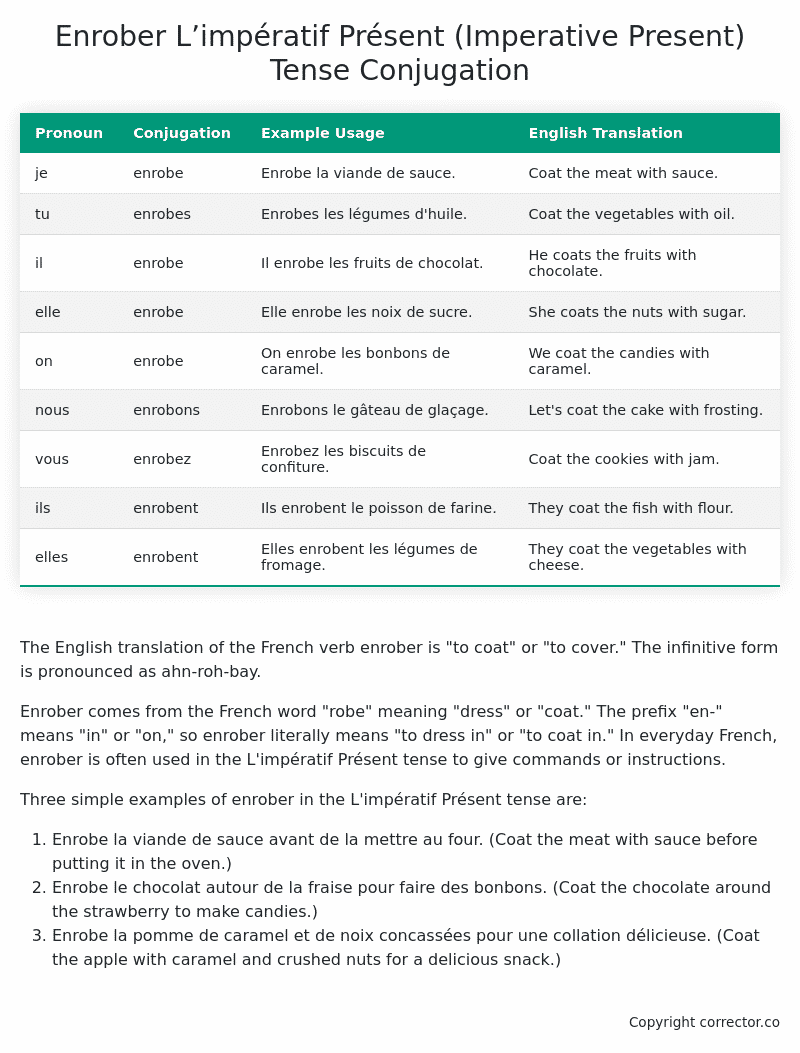L’impératif Présent (Imperative Present) Tense Conjugation of the French Verb enrober
Introduction to the verb enrober
The English translation of the French verb enrober is “to coat” or “to cover.” The infinitive form is pronounced as ahn-roh-bay.
Enrober comes from the French word “robe” meaning “dress” or “coat.” The prefix “en-” means “in” or “on,” so enrober literally means “to dress in” or “to coat in.” In everyday French, enrober is often used in the L’impératif Présent tense to give commands or instructions.
Three simple examples of enrober in the L’impératif Présent tense are:
- Enrobe la viande de sauce avant de la mettre au four. (Coat the meat with sauce before putting it in the oven.)
- Enrobe le chocolat autour de la fraise pour faire des bonbons. (Coat the chocolate around the strawberry to make candies.)
- Enrobe la pomme de caramel et de noix concassées pour une collation délicieuse. (Coat the apple with caramel and crushed nuts for a delicious snack.)
Table of the L’impératif Présent (Imperative Present) Tense Conjugation of enrober
| Pronoun | Conjugation | Example Usage | English Translation |
|---|---|---|---|
| je | enrobe | Enrobe la viande de sauce. | Coat the meat with sauce. |
| tu | enrobes | Enrobes les légumes d’huile. | Coat the vegetables with oil. |
| il | enrobe | Il enrobe les fruits de chocolat. | He coats the fruits with chocolate. |
| elle | enrobe | Elle enrobe les noix de sucre. | She coats the nuts with sugar. |
| on | enrobe | On enrobe les bonbons de caramel. | We coat the candies with caramel. |
| nous | enrobons | Enrobons le gâteau de glaçage. | Let’s coat the cake with frosting. |
| vous | enrobez | Enrobez les biscuits de confiture. | Coat the cookies with jam. |
| ils | enrobent | Ils enrobent le poisson de farine. | They coat the fish with flour. |
| elles | enrobent | Elles enrobent les légumes de fromage. | They coat the vegetables with cheese. |
Other Conjugations for Enrober.
Le Present (Present Tense) Conjugation of the French Verb enrober
Imparfait (Imperfect) Tense Conjugation of the French Verb enrober
Passé Simple (Simple Past) Tense Conjugation of the French Verb enrober
Passé Composé (Present Perfect) Tense Conjugation of the French Verb enrober
Futur Simple (Simple Future) Tense Conjugation of the French Verb enrober
Futur Proche (Near Future) Tense Conjugation of the French Verb enrober
Plus-que-parfait (Pluperfect) Tense Conjugation of the French Verb enrober
Passé Antérieur (Past Anterior) Tense Conjugation of the French Verb enrober
Futur Antérieur (Future Anterior) Tense Conjugation of the French Verb enrober
Subjonctif Présent (Subjunctive Present) Tense Conjugation of the French Verb enrober
Subjonctif Passé (Subjunctive Past) Tense Conjugation of the French Verb enrober
Subjonctif Imparfait (Subjunctive Imperfect) Tense Conjugation of the French Verb enrober
Subjonctif Plus-que-parfait (Subjunctive Pluperfect) Tense Conjugation of the French Verb enrober
Conditionnel Présent (Conditional Present) Tense Conjugation of the French Verb enrober
Conditionnel Passé (Conditional Past) Tense Conjugation of the French Verb enrober
L’impératif Présent (Imperative Present) Tense Conjugation of the French Verb enrober (this article)
L’infinitif Présent (Infinitive Present) Tense Conjugation of the French Verb enrober
Struggling with French verbs or the language in general? Why not use our free French Grammar Checker – no registration required!
Get a FREE Download Study Sheet of this Conjugation 🔥
Simply right click the image below, click “save image” and get your free reference for the enrober L’impératif Présent tense conjugation!

Enrober – About the French L’impératif Présent (Imperative Present) Tense
Usage
Giving commands
Making requests
Offering advice
Expressing desires
Conjugation Formation
Interactions with other tenses
Want More?
I hope you enjoyed this article on the verb enrober. Still in a learning mood? Check out another TOTALLY random French verb conjugation!


